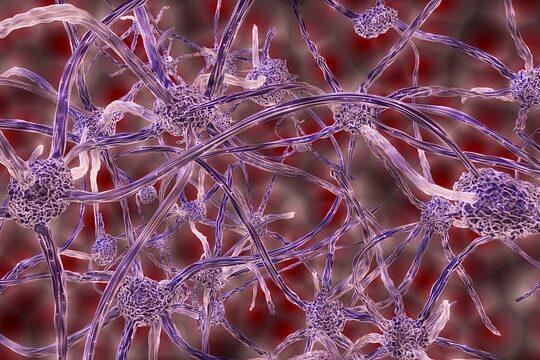Scientists have discovered that the MRAP2 protein enhances the signal from the MC4R hunger receptor, opening a new avenue for combating obesity and protecting the brain.
A key finding in appetite control
Appetite is one of the most complex biological processes in the human body. It depends not only on willpower, but also on a network of chemical signals that the brain interprets to regulate energy intake and expenditure.
Among these signals is the MC4R (melanocortin-4) receptor , a brain protein that acts as a sensor for hunger and satiety.
A new study published in Nature Communications ( Sohail et al., 2025 ) has identified the crucial role of another molecule: MRAP2 ( Melanocortin Receptor Accessory Protein 2 ), a protein that modulates MC4R activity and functions as a true “molecular hunger switch” .
What did scientists discover about MRAP2?
The team from the Universities of Leipzig and Berlin, led by Patrick Scheerer, used advanced cell biology techniques, fluorescence microscopy, and three-dimensional imaging to study the interaction between MRAP2 and MC4R.
Their findings reveal a surprising mechanism:
- MRAP2 enhances the satiety signal. By binding to MC4R, the MRAP2 protein amplifies the Gs/cAMP
signaling pathway , which intensifies the feeling of satiety. The brain receives the signal that one has eaten enough more strongly. Reference: Nature Communications - Increases signal duration.
MRAP2 reduces the recruitment of the β-arrestin2 protein, preventing the receptor from “turning off” and being removed from the neuronal membrane.
This prolongs the action of the MC4R and maintains the feeling of fullness for longer. - It optimizes the receptor’s shape.
The protein encourages MC4R to adopt a monomeric—more functional—structure instead of forming inactive complexes (oligomers).
According to the study’s structural modeling, MRAP2 docks with the receptor’s TM5 and TM6 transmembrane regions, reinforcing its stability. - It facilitates its transport and neuronal localization.
Previous research has already shown that MRAP2 is essential for MC4R to reach the surface of neurons in the hypothalamus, where it can effectively transmit satiety signals ( JCI Insight, 2024 ).
From molecular biology to anti-obesity therapy
Mutations in the MC4R gene are one of the most common genetic causes of severe obesity.
The discovery of how MRAP2 regulates this receptor opens a potential avenue for designing more precise and personalized treatments .
Currently, there is one approved drug— setmelanotide —that activates MC4R in patients with certain genetic obesity syndromes.
However, understanding the role of MRAP2 could lead to the development of drugs that act with greater specificity and fewer side effects ( Nature Communications, 2025 ).
Furthermore, MRAP2 not only interacts with MC4R: it also modulates the ghrelin receptor (GHSR1a) , related to hunger stimulation, which could allow a comprehensive regulation of appetite ( Nature Communications, 2017 ).
Obesity and the brain: a worrying link
Obesity not only increases the risk of metabolic diseases: it also triples the risk of dementia in later life.
According to the Spanish Alzheimer’s Confederation ( CEAFA, 2024 ), being obese at age 30 triples the likelihood of developing cognitive decline.
The mechanisms behind this phenomenon include:
- Chronic inflammation : Excess body fat generates cytokines that damage neurons.
- Insulin resistance : reduces the brain’s ability to use glucose, affecting memory.
- Oxidative stress and vascular damage : cause accelerated aging of brain tissue.
- Hormonal alteration : leptin and adiponectin, weight-related hormones, influence neuroplasticity.
A NutritionFacts.org meta-analysis (2024) indicates that obese people have up to a 90% higher risk of dementia compared to normal-weight individuals.
Furthermore, obesity in middle age is associated with reduced brain volume and lower gray matter density ( NutritionFacts.org ).
Can brain damage associated with obesity be reversed?
Some studies suggest that weight loss improves brain health .
Research by Zeighami et al. (2021) published on arXiv showed that patients undergoing bariatric surgery experienced a reduction in “brain age” equivalent to 5.6 years two years after the procedure ( arXiv.org ).
These findings reinforce the hypothesis that metabolic changes are also reflected in cognitive function and that treating obesity could help prevent brain deterioration .
MRAP2 and the future of personalized nutrition
The discovery of MRAP2 as a key modulator of the hunger receptor opens up a promising field for precision medicine.
In the coming years, researchers will focus on:
- Confirm the effects of MRAP2 in animal and human models.
- Develop molecules that mimic its action on MC4R.
- Explore the relationship between appetite modulation and brain health.
- Apply artificial intelligence and nutrigenomics to identify which genetic profiles respond best to these types of therapies.
Conclusion: A breakthrough with dual impact
The Nature Communications study ( Sohail et al., 2025 ) represents a milestone in understanding how the brain regulates hunger at the molecular level.
By uncovering how MRAP2 amplifies the satiety signal and stabilizes the MC4R receptor, scientists have identified a new control point in the body’s energy system.
Beyond weight control, this discovery could have implications for brain health and cognitive aging by reducing the metabolic effects of obesity on the brain.
The science is still in its early stages, but all indications are that the future of the fight against obesity lies in the brain .
Sources consulted
- Sohail, A. et al. (2025). MRAP2 modifies the signaling and oligomerization state of the melanocortin-4 receptor. Nature Communications
- Sebag, J. A. et al. (2017). MRAP2 regulates energy homeostasis and receptor signaling. Nature Communications
- JCI Insight (2024). MRAP2 is essential for MC4R trafficking to neuronal primary cilia.
- Zeighami, Y. et al. (2021). Obesity, aging, and brain morphology: reversibility after bariatric surgery. arXiv.org
- Spanish Alzheimer’s Confederation (CEAFA, 2024). Being obese at age 30 triples the risk of dementia.
- NutritionFacts.org (2024)
Date 06/10/25
Photo: Pixabay
Note: The Nutrigenomics Institute is not responsible for the opinions expressed in this article.






